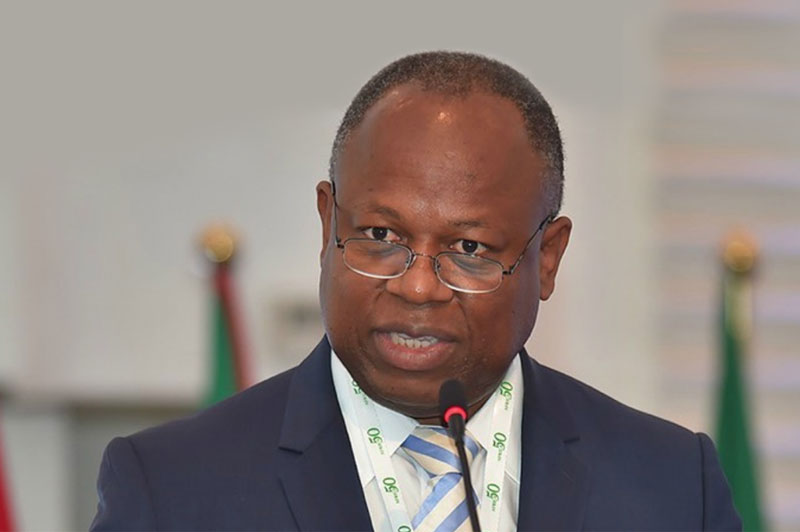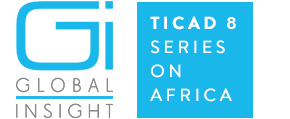
17 Dic Interview with Mr. Alain Ebobissé, CEO of Africa50
Global Insight (GI): You come from a very important leadership position in the World Bank and you are certainly a leader with hands-on and wide experience on PPPs and enabling international partnerships. What is your ultimate and most exciting objective as CEO of Africa50?
Thank you very much once again for this opportunity to speak with you today.
Prior to becoming the Chief Executive Officer of Africa50, I spent more than 17 and a half years at the World Bank Group, based in Washington DC. For the eight years before that, I was the Global Head of one of the businesses of the World Bank Group, which develops Infrastructure PPPs globally across the world in the emerging market. So, I have a very good understanding of the manner in which such projects are developed through PPP’s, through private Investments. I was with the IFC, which is the private-sector arm of the World Bank Group.
Africa50 is an interesting instrument that was created following a call by African heads-of-state as part of the so-called PIDA program, infrastructure development in Africa. These African leaders called for the creation of an innovative instrument to help tackle the big infrastructure gap that we have here in Africa – specifically through private investment. That’s how Africa50 came into being. The African Development Bank then took the initiative to propose the creation of Africa50 in answer to the call from these heads of state. We are working towards bridging the infrastructure gap in Africa exclusively through private investment.
We are owned by African governments, the African Development Bank, and by two African central-banks. These shareholders have committed funds, totalling today close to nine hundred million dollars in committed capital. I believe that more importantly, they have given us the mandate to operate commercially as a private-sector fund. We are an organization owned by government shareholders, but with a mandate to operate commercially because we need to catalyse more private investment in infrastructure in Africa. Our goal as Africa50 in the medium to long-term, is to make a significant impact to reduce this infrastructure gap in Africa. Longer-term, we hope there will be no gap, or that at least the gap will be substantially reduced. Short-term my goal was to build the organization.
When I took over Africa50, some work had been done, especially on the fundraising side. However, we were still housed at the Africa Development Bank. My goal in the past two years has been to build operations, to ensure that Africa50 functions like an operational company, having staff, and a management team. We hired the management team over the last two years. The staff, the investment officer and other colleagues. We also have our offices. We are established here, and have put systems in place – we are making our first Investments. This is what we have been doing during our first two years.
Medium-term, the goal is to make sure we get all African countries onboard as shareholders. Today, 27 African countries are stakeholders in Africa50. Another important goal is to sign up international investors as shareholders – these private sector investors will validate what we are doing. It is vital we have private investors as part of the Africa50 shareholder team. This is one of my key objectives, to attract private investors. This is an angle where I see Japan as a potential partner. Japan has quite a number of pension funds, starting with the government pension fund, which I understand to be the biggest in the world. We look forward to talking to them when we are ready, and making them an offer to possibly co-invest with us. So, our medium-term strategy is getting all African countries to be shareholders in Africa50, and to secure international, private investors as shareholders. At the same time continuing to aggressively invest in projects. Finally, long-term, when we get there, is about significantly reducing the infrastructure gap on the continent.
GI: Morocco benefits greatly from having a King, with a clear long-term vision, most of the key policies are based on continuing measures over 20 to 25-year period. In your opinion how does the Kingdom benefit from having a King and what are your future expectations for Morocco?
That is a very good point; when Africa50 was looking for headquarters, my predecessors ran an initiative, almost a competition, to select the place where our headquarters would be located. There were a number of proposals in Morocco submitted. The idea of setting up in Morocco was very attractive to people because of Morocco´s long-term stability.
The King has a medium to long-term vision, and is able to implement the country’s objectives using quality people and highly qualified civil servants, backed up by the excellent human resources in this country. Things are working reasonably well within Morocco. We have a headquarters agreement with the government that provides us with a framework that allows us to operate, not only in Morocco, but across Africa. Morocco is one of our shareholders, but we do not treat Morocco any better than any other shareholder. We are very commercial in the way that we look at projects. We go where the good projects are.
GI: The focus of Africa50 “medium to large scale infrastructure projects that have a significant development impact while offering an appropriate return to investors”. Energy, power and electric distribution are some of the most pressing challenges with a strong impact on African development. Can you share, in your view, the list of all other major challenges and explain what are you going to do in order to turn them into opportunities?
I will start with the last point that you mentioned, I see all these challenges as opportunities. I think that part of my job is to communicate to potential investors that some of these challenges are actually opportunities. When you take the power sector, the energy sector; experience has demonstrated that when a power project is well structured, although it could be difficult to put together, that the participants actually make a lot of money investing in such projects, whilst delivering good services. These are win-win situations that we want to create. Here I have personal experience to bring to the table from my time at the World Bank Group – I put on my global hat.
Investors are coming to spend money and also to allocate human resources to develop a project to bring them profits. If projects are well structured the returns are actually good. The power sector has been seen to be one of the most commercial in the infrastructure space, globally, in most countries. Today power generation is almost exclusively carried out by the private sector. The transmission phase is still more or less managed by the public sector. Although in many countries, in Latin American for example, Transmission has been moved to the private sector. What we are trying to say here to our government shareholders, is that they don’t need to be involved as a government, financing a power generation project. Institutions such as Africa50 and all our sponsors, including those from Japan – Mitsubishi and others – will be interested in coming in, and investing in these projects. They can have a huge impact and make money at the same time. There is nothing wrong with making money as long as you are delivering good services. Power is one of our priority sectors because it is needed to support African industry. Africa needs to Industrialize, that’s how we are going to give jobs to people. Beyond power we have many other projects. We are very excited to be able to invest in transport projects – especially in airports and ports, and in toll roads or bridges. We are looking as these selectively.
There is a project we are committed to doing which is quite exciting. It’s a bridge between the two Congos: Congo Brazzaville and Congo-Kinshasa. Imagine having two countries which are separated by a river which is not that large, approximately 1.5 km. There is no bridge between the two countries, people are using boats to connect. More than 10 million people in Kinshasa and around 4 million people in Brazzaville. There is no physical link. We will carry out this project, which is going to have a huge impact. It’s going to be a toll-road. People will make money, whilst at the same time creating a huge impact.
An area where Japan has a competitive advantage that I would like to focus on, is ICT, information and communication technology. We would like to push that forward, because we want to boost broadband penetration in Africa. People have to be connected to the internet to be able to have the jobs of the future.
Finally, another project of importance, which is also of interest to Japan, is the gas sector. We have a lot of gas deposits in Africa that need to be to be developed. Some of the gas will be exported to countries like Japan, and some of it should come to Africa to fuel our economic development. There has to be the right balance. We look forward to working with sponsors that are willing to develop these gas fields, not only for export, but also for use in the African context, building a pipeline for that purpose.
GI: Regions and countries are competing to attract investments and capitals. Infrastructure needs are worth billions and they include the U.S., Europe, Asia and of course Africa too. Africa’s infrastructure financing needs were for too long neglected. Is this finally changing? If so, why is this happening now?
Private investors are not philanthropists, they go where they can make a fair return for the risk they are taking. The fact of the matter is that Africa has not received enough investment for the development of infrastructure. If you look at the figures of the World Bank Group, PPIF, I believe on average, over the last five years, the figures show Africa has probably received about eight billion dollars per year. An emerging region such as Latin America has received over 20 billion dollars. You can see the gap between what our continent is receiving compared to other emerging regions. I am of the view that there is no reason why we cannot increase the investment we are receiving today, in all the continent, In terms of private investment and infrastructure.
Our goal is to move substantially above the 8 billion dollars on average per year that we are receiving. The time is right – I am going to tell you why: a number of countries, not all of them though, have a sense of urgency in developing their infrastructure. There is a wide consensus today among policy makers that the private sector just does not have enough money to fund huge projects, that is over. Governments have to implement a reform to attract private investment, we see this happening in some countries more than others. Some countries are more advanced in terms of catalysing private investment and infrastructure.
A further factor is the growing middle class in Africa – they are connected and demanding services. Governments failing to fulfil this need will be voted out of power. In some of my conversations with African leaders, including presidents, especially the private conversations, I have been made aware that they are extremely interested in delivering on projects. Some of them so quickly it is not even possible. They have a sense of urgency – they want things to be done yesterday. The challenge is that sometimes the administrators, the people needing to carry out the mechanics of the project are still a bit slow. You see a culture where top leaders want to deliver things fast, but this urgency has not yet fully permeated across all the echelons. That’s where institutions such as Africa50 can be helpful, because we can help those governments to speed up the implementation of projects. We have processes and procedures similar to the private sector. We can move faster than government administrators. Governments would team up with us in the country in question, having us help them develop a specific project because we can move more quickly. The name of the game for us today is to be doing things faster, and on a larger scale.
I would like to invite companies to unite with us – we will put our own money into projects. We are not asking investors to come and give us money, we have capital (not a lot, 870 million dollars), but we will put money into ventures and team up with other parties to move projects forward, fast.
One item I would like to highlight, is that Africa50 is relatively unique in being involved in the early-stage of project development, we can invest in speculations that are still in the concept phase where the project is not yet fully developed and is still not bankable. We can provide the money to fund the feasibility studies, the legal expenses, to make the project a reality. We like to partner with companies globally, from Africa, Japan, from the US, from wherever, as long as they have the intent to deliver a quality project, making reasonable returns. We prefer to partner with them from the start of the enterprise, bringing to the table financing, but also the ability to resolve issues on the ground. Together we can deliver a first-rate project for the continent.
GI: Do you have a final message you would like to share with our readers in Japan?
My message is that we have this institution that was created by African heads of state, to focus exclusively on infrastructure – through a private-sector lens. The African countries have capitalized on Africa50 today, to the tune of 870 million dollars. We are able to work with private companies – we would very much like to start ventures with investors from Japan; to develop projects together and to co-invest. We also want to leverage the funds that we have from African governments to bring in additional investors; to work jointly with companies to deliver on successful projects. We have financiers that can co-invest with us. Governments can use us to deliver their mandate, because they want to impact Africa positively. We are an instrument they can utilize to achieve their goals. We are already involved in significant ventures, together we can reach accomplish even more.


